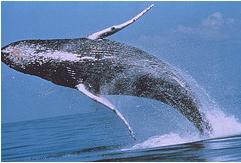Sent to you by nigel via Google Reader:

As you've probably heard, the rise of noise-pollution in the oceans has caused huge problems for marine life. Animals that echolocate -- like whales -- are increasingly deafened by the din of shipping vessels and military sonar. Indeed, it's apparently gotten so bad that we are now seeing a rise in collisions between whales and boats; it's bad for the whales, of course, but if if a small vessel hits a whale, even humans can die too.
This inspired Michel André, a marine biologist and biotechnology engineer, to develop a whale-avoidance system so that boats could detect nearby whales and steer away. The problem is that any "active" system -- something that sent our sonar probes -- would just add more noise to the oceans and further confuse the whales. He wanted to do it passively. So he started designing an array of listening devices that would listen for the clicks and whoops of whale-call, or even the sound of rain and waves splashing along silent whales.
But here's the really awesome part. As Gizmag reports:
A remarkable feature of his system is its ability to single out and track an individual whale among all its "family" members in the same area -- a breakthrough made with the help of a West African musician. After years of research, André's discovery that the sequence of acoustic signals transmitted by the sperm whales could be used to identify individual mammals -- a process called Rhythmic Identity Measurement (RIME) -- was almost by chance. In attempting to unravel the chaotic rhythms of the sperm whale clicks, he was struck by the similarity between his underwater recordings and African tribal music. A Senegalese griot (drummer) confirmed the likeness and -- amazingly -- was able to pick individual whales from André's recordings through their distinctive rhythmic structures.
A whale-detection system powered by algorithms derived from African drumming. Oh yes. I love the way that musicians always wind up being the ones who can understand whalespeak better than anyone else, like that guy who figured out that whales appear to have a particular affection for the clarinet note G.
Things you can do from here:
- Subscribe to collision detection using Google Reader
- Get started using Google Reader to easily keep up with all your favorite sites
No comments:
Post a Comment